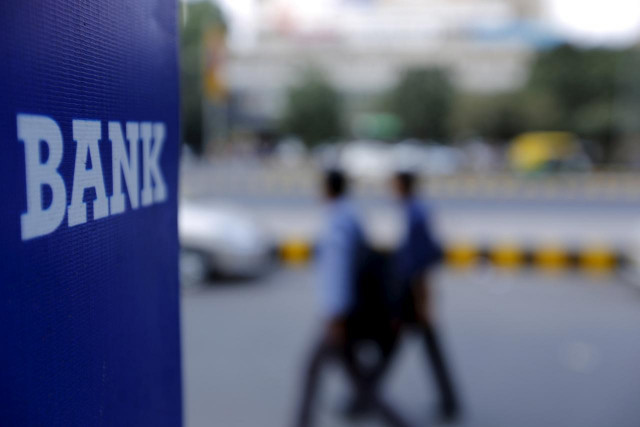Fickle policies & foreign investment
Military rulers have a different style of governance than democratic setups

Commuters walk past a bank sign. PHOTO: REUTERS
Firstly, there is not an iota of doubt that Pakistan’s economic policies have been erratic lacking sustainability. A trade and investment-friendly environment cannot be created through such policies because investors and traders are driven by the motive of profit. Fickleness of a country’s economic policies intimidates traders and investors and they shy away from investing in that country and have trade with it. The problem with Pakistan has been that economic objectives have been subservient to physical security aims. Therefore, as the country has been considering itself in a perennial antagonistic security atmosphere therefore, economic objectives of foreign policy could never dominate security objectives. Then there has been a problem with our political system. Nearly half of the time since the creation of Pakistan the military has been directly ruling the country and the military rulers have a different style of governance than democratic setups.
However, having said this Gen Ayub Khan’s era (1958-69) arguably provided the most conducive business and investment environment. This was fundamentally because he adopted the liberal economic model particularly of the American economist Walt Whitman Rostow and also providing stability in his long era. However, when Zulfikar Ali Bhutto came to power in 1970s he adopted antipodal economic policies by nationalising industries and carried out land reforms under his shady ideology of Islamic Socialism. However, when his daughter came to power in the late 1980s, she reversed the economic policies of even her father and pursued public-private partnership policies. There was also economic stability and sustainability in General Zia’s (1977-88) era due to continuous aid from the US and his finance minister, Dr Mehboob-ul-Haq. Then for more than a decade the PPP of Benazir Bhutto and the PML-N of Nawaz Sharif were forming governments one after the other with the first favouring feudal lords and agriculturists and the second industrialists and businessmen.
Former military ruler Musharraf attempted to create a trade and investment-friendly environment. But he made a fundamental mistake by picking a banker, Shaukat Aziz, as architect of his economic policies. During the Musharraf era there was some economic growth but it was primarily consumer-led growth rather than real growth in the manufacturing, agriculture and services sector. However, Pakistan could not attract foreign investment due to the US-led start of Global War on Terror (GWoT), whose main theatre has been the Af-Pak region. The following PPP government in 2008 also faced the same security situation but at a time when neoliberal economic policies have been dominating the world; the PPP government could not reduce the oversized state involvement in the economic sphere rather made it more pronounced. The ensuing PML-N government, which only a month back completed its five-year tenure, reversed most of the economic policies of the previous PPP rule. Although there has been some GDP growth during the PML-N’s last stint in power, it has come at the cost of massive foreign and domestic debt, plummeting FDI, foreign exchange reserves and consumerism.
In such political, security and governance atmosphere, which we have had in our country, one cannot think of economic stability and a business and investment-friendly atmosphere. Now much would depend on the next elected government, how it learns from mostly failed economic policies of previous governments.
Published in The Express Tribune, July 2nd, 2018.
Like Opinion & Editorial on Facebook, follow @ETOpEd on Twitter to receive all updates on all our daily pieces.














COMMENTS
Comments are moderated and generally will be posted if they are on-topic and not abusive.
For more information, please see our Comments FAQ